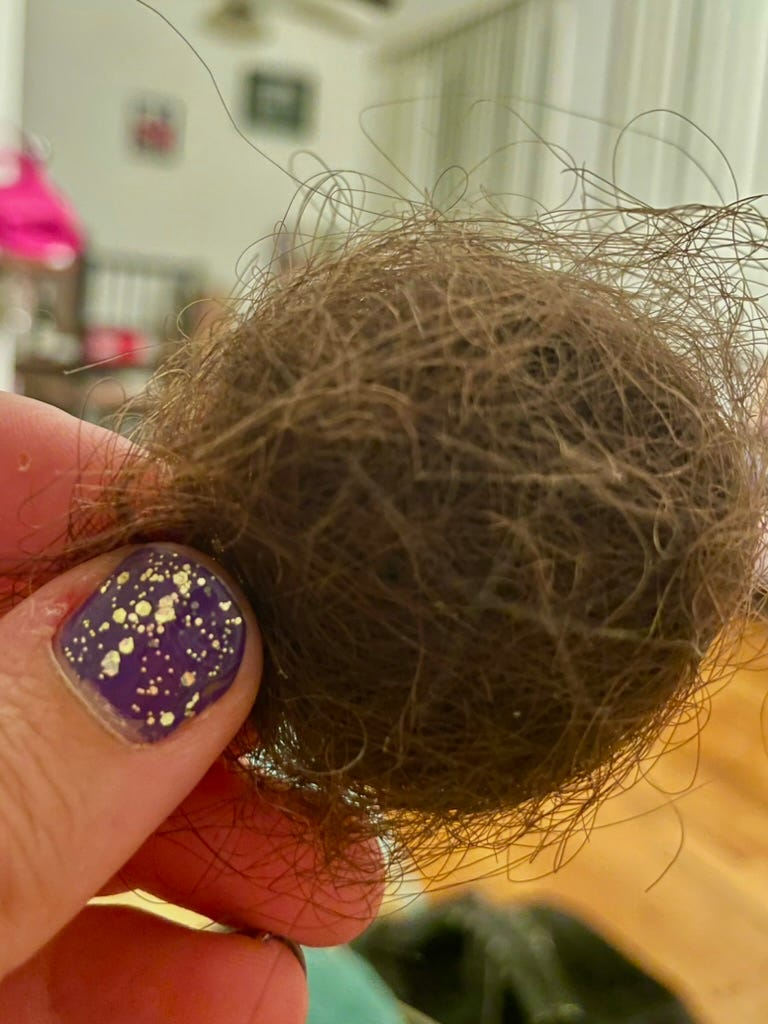I don’t know about you, but I’m stressed.
I started a new job in late January, and I have spent 2025 thus far learning new techniques, new colleagues, and a new city. Oh, and then there’s the ongoing erasure and demonization of trans and gender non-conforming people.
Often, I come home from work and plop myself on the couch and place my computer in front of me. As I mindlessly complete online puzzle games, I start to self-soothe by running my fingers through my hair. This is a form of self-grooming, not unlike a lab mouse which grooms itself under duress.
Lately, I’ve noticed a lot of hairs left in my hand after self-soothing, plucked from my scalp by the sheer force of my fingers running through my hair. In general, I expect some hairs to fall out at any given time, but enough to form balls the size of my palm? My hair still appears full, but that seems excessive ;;;
Telogen effluvium refers to the excessive loss of hair during acute stress. At the cellular level, telogen effluvium alters the hair growth cycle. If you’ve ever spent time, money, and energy to remove unwanted hairs, the cycle of hair growth may already be familiar to you.
At any given time, not all hair follicles are actively growing hairs. Instead, follicles asynchronously cycle through three distinct states. Anagen is the phase where hairs are actively growing longer. The next phase, catagen, is when the hair stops growing but remains attached to the follicle. Finally, hairs in telogen detach from the follicle and eventually fall out. After telogen, the cycle begins anew with follicles returning to a state of anagen.
A state of telogen effluvium essentially skips the catagen phase. Once anagen ends and hair growth stops, the follicle immediately enters the telogen phase. With more hairs in telogen, you start to shed hairs at a faster rate than before the stressor (or other cause) which prompted the telogen effluvium in the first place.
I have to admit: losing hair is not part of my gender goals. I love my hair. Right now, it’s the longest it has ever been, as my family can attest. As a child, I would get a monthly buzz cut. I resisted any suggestions to try another style. There was comfort in the no-nonsense and inscrutable simplicity of the buzz cut.
Until I got to college. It started to grow longer out of pure neglect. Not so long as to take on a feminine appearance but long enough to still pass as self-styled masculine (yet unkempt to enough to feel shame at my messy appearance).
The shame disappeared after my egg cracked in early grad school. I recognized that my hair would transition with me in the years to come. Instead, the slowly lengthening locks became a source of joy — proof that my body could, in fact, be feminine.
The last time my hair was cut was mid-2020. I was trapped in the glorified dorm room which was my on-campus apartment. My hair had gotten too long for the 3-4 weekly zoom calls which had become my lockdown life. So, I grabbed my kitchen scissors and started snipping.
I guess I’m due for a trim.
On average, humans have ~100,000 scalp hairs (with some variation depending on hair color). Of those 100,000 follicles, each is somewhat randomly in a different phase of the growth cycle. Since telogen effluvium essentially causes follicles to skip the catagen phase, now all those hairs are roughly divided between only two states: hair growth (anagen) and hair shedding (telogen).
This effect is driven by high levels of the hormone cortisol which increases during periods of intense stress. Periods of elevated cortisol temporarily alters the physiology of your follicles by increasing the breakdown of the molecules which comprise hair. This accelerated decomposition of follicles is how follicles skip the catagen (or resting) phase of the hair growth cycle.
Notably, this is distinct from age-related balding where thick and pigmented hairs (terminal hairs) are progressively transformed into fine, unpigmented hairs (vellus hairs). This transformation is controlled by androgens, especially the extremely potent dihydrotestosterone (DHT). Therefore, people with high androgens (especially DHT) are most susceptible to balding.
In contrast, telogen effluvium does not necessarily lead to noticeable patches of lost hair since neighboring follicles aren’t synchronized in their growth cycles. (However, some people may present with patchy hair if they have fewer scalp hairs to begin with.)
As part of my new job, I am routinely caring for and handling lab mice. As you might imagine, they get stressed when a strange woman arrives to pick them up by their tail. Their self-soothing begins shortly after I take off the lid of their cage.
Watching the mice perform a familiar set of self-grooming behaviors has been an unexpected source of empathy for the little creatures. I, too, know what it’s like to be so haunted by the contours of your existence such that the bodymind takes on light damage while searching for relief.
The mice and I have something in common: We are both living under a set of conditions that we can’t directly control. On it’s face, this is a recipe for nihilistic complacency in ruminating on the powerlessness of the moment. But, nihilism is merely a human concept.
The mice show no traces of nihilism in their smooth little brains. Instead, they resist. Ever wily, they contort their bodies and try to bite my hand. They care for their cage-mates, sometimes even shielding each other as my hand grasps at their tails. Once, a mouse even jumped off the wire holding pen, out of the lab hood where I was working, and onto the ground. (Shhhhh, don’t tell anyone.)
In those moments, I realize how fixating on my own stress cements the feeling of powerlessness in place. But power is not that simple. Disruptive protests help resist authoritarianism. We can support and shield each other, like some have already done when ICE arrives in their neighborhood. If you can jump out and situate yourself in a better environment, then it’s worth considering.
Ultimately, some extra strands of hair is a small price to pay compared to what others have already lost, especially non-citizen Americans, trans adolescents, and incarcerated trans people.
I think my main character syndrome can take a seat for a while.











Hair loss definitely has to do with stress. That's your situation.
I knew a young woman who had severe depression and social anxiety that was so severe she lost all the hair on her head. She went into a dark period and it took a year at least before she got back to where she was. True story.
When I go into Walmart or somewhere such as on a road trip I'm wearing my casual female clothes with my jewelry and makeup and overall feminine appearance. Sometimes I'm probably hyper feminine as a protective measure. So at the supermarket the cashier says to me: thank you ma'am. The Walmart greeter says thank you ma'am on the way out as I offer up my receipt. All good. Still, I experience more stress and anxiety out in public now that I did not have before the Trump administration started dismantling support for transgender people and recognition of them. There's no denying it. I really am surprised how much it affects me. I'm very careful when I go out and I think this constant vigilance is really too much stress for a body to take. So now I stay out of public a lot and rest more than I usually would. And it's hard not to feel defeated and rejected by the entire society because of this. Allies or not. Yes a lot of it's in my mind, but it's still affects me. It's very unhealthy right now to live as trans in society. And that's the way they want it. In a sense they have already won. This needs to be corrected. I don't know how that will happen. The way things are now, it's normal to feel stressed.
I’m sorry to hear that. I realized last night how stressed I’ve been (in large part about the state of the world) and that I need to start intentionally spending time relaxing. I hope you can find ways to as well.